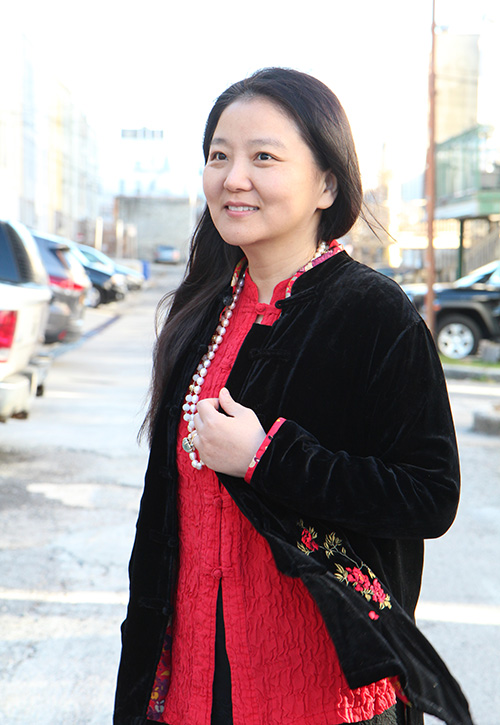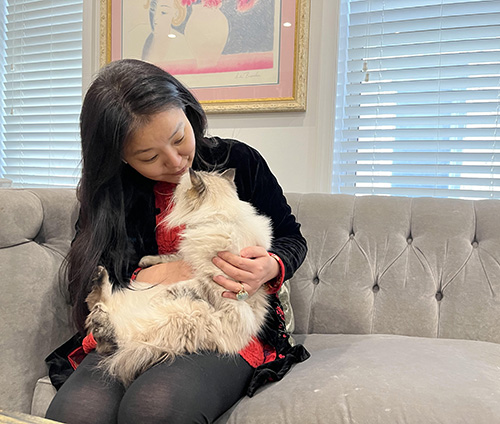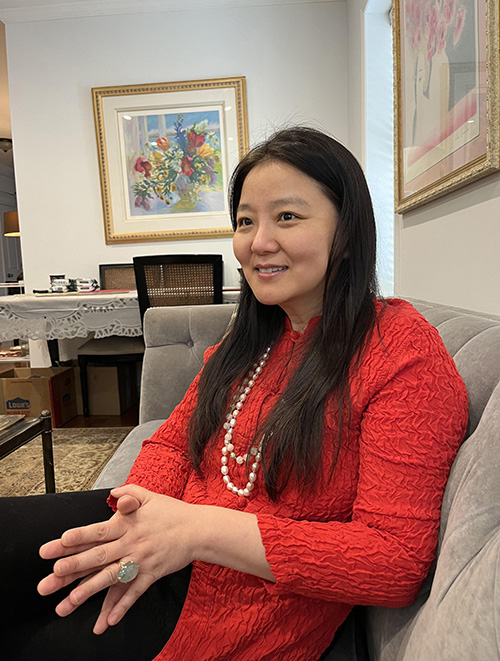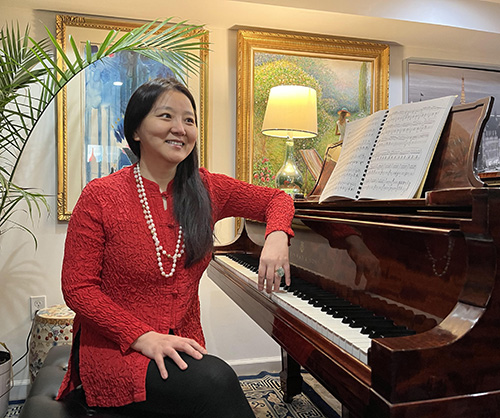The sound of the piano, powerfully playful, echoes through June Xiao’s duplex apartment.
With her sleek Siberian, Milford, at her feet, she heads to the basement, down two sets of steep steps that are so narrow you almost have to turn sideways, where one of her students is practicing on the Hamburg Steinway.

June’s from Shanghai, China.
(The gleaming grand piano, in flamed mahogany, came in through the garage legless and was reassembled on site.)
Benny, who at 15 is the same age as June’s daughter, Caroline, is a student in the Manhattan School of Music pre-college program. He has a competition at Juilliard in a couple of hours, and June’s giving him last-minute pointers – and confidence.
They are working on Rachmaninoff; Milford is deciding whether to stay on the floor or jump on the piano.
June, an enthusiastic woman with long black hair and a dulcet voice that’s as soothing as wind chimes, stops Benny mid-note.
Make the melody louder, bolder, she advises in soft tones, adding what he already knows: This will be a make-or-break piece for him, but he can do it once he puts his mind and fingers to it.
Benny starts over, something he’s been doing a lot since he arrived with his mother last night after a three-hour drive from Pennsylvania.
June, a classically trained pianist, has spent her career preparing students like Benny for successful competitions and conservatory auditions and teaching those of lesser note to play for their and their parents’ amusement and enjoyment.
She knows first-hand what they are going through. She took her first lesson when she was 7.
Her initiation and interest came about in an unorthodox manner.

Having a cuddle with Milford.
June’s from Shanghai, China, and when she was 4 years old, so young she barely remembers what happened, her entire family – mother, father and significantly older brother and sister – was forced to do manual labor in the countryside during Chairman Mao’s infamous Cultural Revolution.
It just so happens that her mother was head of the international students’ department at the Shanghai Conservatory of Music, which is akin to Juilliard, and that the school had a live-in day-care center for children of employees.
“The music professors who were too old to go in the fields became my nannies,” she says. “I used to become totally still and silent whenever I heard someone playing a piano. When my parents were allowed to return a couple of years later, the piano professor suggested lessons. I never had a choice.”
She smiles at the memory – she wouldn’t have had it any other way.
Like all the other students, June practiced two to four hours every day.
“It’s all about consistency,” she says, adding that she played in her first competition when she was in elementary school.
All that practice time turned June into an excellent player, a fact that didn’t go unnoticed for long.
When she was 15, she came to the United States under the sponsorship of the Rotary Club of Raleigh, North Carolina and for a year and half lived with a family who had three daughters.
“It was always a struggle my first year because I didn’t know any English,” she says. “In English class, we were studying Shakespeare, and I couldn’t find the words in any dictionary. Biology also was difficult because of the scientific terms.”
She adds that she had minimal contact with her family – Skype and Zoom didn’t exist, and long-distance calls were prohibitively pricey.
When she got the opportunity to enter college early on a full scholarship, she did so, earning a bachelor of music from Case Western Reserve University and Cleveland Institute of Music.
For three years, she worked in Hong Kong as a music teacher.
She returned to America and earned a master’s degree in music from Carnegie Mellon University because “when I was teaching, I realized that I hadn’t learned enough.”
After Carnegie Mellon, she began working on a doctorate at Indiana University Bloomington.
When she finished her coursework, she returned to China, where during her seven-year stay, she was the founding music department chair at Jinan University in Guangzhou, taught at the Shenzhen Arts School and was a consultant for China’s Poly Performing Arts.

June started taking piano lessons when she was 7.
She returned to the states briefly to give birth to Caroline. Three years later, she came back, to Indiana University, this time to finish her thesis.
“I left Caroline with her dad, but I had no idea that he would refuse to let me see her,” she says as Caroline walks into the living room. “My husband had her 4 years – from ages 3 to 7. I knew I was not going to get custody, so I took her.”
Just for the record, Caroline does NOT play the piano, will NEVER play the piano because she’s a teenager and god forbid that she would take direction from her mother; she’s a debate and mock trial state champion instead and has a ton of trophies to prove it.
They arrived in New York City with a rental car, four boxes and two suitcases, and June resumed her piano-teaching career.
In the summer of 2020, in the midst of the pandemic, June moved to Astoria. Recently, she joined the faculty of The Mannes School of Music at The New School.

June gives private piano lessons on the grand in her basement.
“I’m stepping out of my basement to a more public platform, so I can put my students in a conservatory setting,” she says.
June teaches students of all levels – something she had to get used to because in China she focused only on those who aspired to be professional players – and helps the best of them with applications and auditions for pre-college music programs.
“As a teacher, my achievements are through my students,” she says.
Benny and his mother head out the back door for the train.
If he’s nervous about the competition, he doesn’t let June know it.
Copyright 2023 by Nancy A. Ruhling
